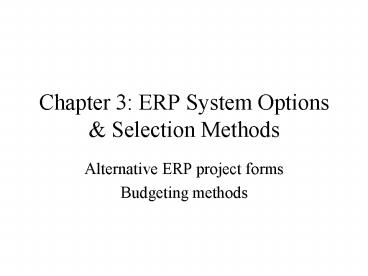Chapter 3: ERP System Options - PowerPoint PPT Presentation
1 / 17
Title:
Chapter 3: ERP System Options
Description:
Chapter 3: ERP System Options & Selection Methods Alternative ERP project forms Budgeting methods – PowerPoint PPT presentation
Number of Views:111
Avg rating:3.0/5.0
Title: Chapter 3: ERP System Options
1
Chapter 3 ERP System Options Selection Methods
- Alternative ERP project forms
- Budgeting methods
2
IS/IT Projects
- Typically
- Late
- Over budget
- Fail to satisfy design specifications
- ERP projects
- Are larger than normal
- Can be expedited (if you do it vendors way)
- Cost range 5 million to over 100 million ()
3
Alternative ERP Options
Method Advantages Disadvantages
In-house Fit organization Most difficult, expensive, slowest
In-housevendor supp. Blend proven features with organizational fit Difficult to develop Expensive slow
Best-of-breed Theoretically ideal Hard to link, slow, potentially inefficient
Customize vendor system Proven features modified to fit organization Slower, usually more expensive than pure vendor
Select vendor modules Less risk, fast, inexpensive If expand, inefficient and higher total cost
Full vendor system Fast, inexpensive, efficient Inflexible
ASP Least risk cost, fastest At mercy of ASP
4
Changing Nature of IT
- Technology is highly dynamic
- ERP projects often take years to install
- Vendors are responding by expediting
- As long as you do it their way
- Improved versions may be on market by the time
you install your system - This is one advantage of an ASP
5
IT Selection Practice
- Hinton Kaye 1996
- IT tends to be viewed as capital budgeting
- Implication is that clear financial return is
expected - Sound thinking, but benefits often intangible
(yet real) - Some strategic investments require bold judgment
- Conversely, companies have gone broke buying IT
6
IS/IT Project Risk FactorsSimms 1997
- Project manager ability
- Experience with this application type
- Experience with programming environment
- Experience with language or system
- Familiarity with modern programming practices
- Availability of equipment, software, language
tools - Completeness of project team
- Personnel turnover
- Project team size
- Relative control of project manager over project
team
7
Financial techniques for Capital Budgeting
- Payback
- Discounted cash flow
- Cost-benefit analysis
- These are the more formal mechanisms implied by
Hinton Kaye as capital budgeting - Anything with as great an impact as ERP needs to
have some estimate of cost, benefits - Need to recognize that precise numbers not worth
obtaining
8
Bacon 1992 survey of IT project selection
methods
- Financial Criteria
- NPV, IRR, payback
- profitability index
- budgetary constraint
- Management Criteria
- Requirements, respond to competition, etc.
- Development Criteria
- Technical/ learning new technology, probability
9
Bacon findings
- More formal methods often not used
- Why waste effort if know you will do it?
- Many numbers used inaccurate anyway
- More formal methods reserved for larger project
(like ERP) - Management criteria focus on intangible
- Technical a matter of maintaining
state-of-the-art systems
10
Survey of ManufacturersMabert et al. (2000)
Olhager Selldin (2003)
FORMAL METHOD Use in US Use in Sweden
ROI 53 30
Payback 35 67
Expected NPV 15 12
Other 11 20
11
Expected Installation TimeMabert et al. (2000)
Olhager Selldin (2003)
Time to Install ERP US Sweden
? 12 months 34 38
13 to 24 months 45 49
25 to 36 months 11 8
37 to 48 months 6 4
gt 48 months 2 1
12
Estimated Installation CostMabert et al. (2000)
Olhager Selldin (2003)
Installation Cost US Sweden
lt 5 million 42 40
5 million to 25 million 33 35
26 million to 50 million 10 18
51 million to 100 million 7 7
gt 100 million 7 In prior
13
Cost ProportionsMabert et al. (2000) Olhager
Selldin (2003)
Where money spent US Sweden
Software 30 24
Consulting 24 30
Hardware 18 19
Implementation team 14 12
Training 11 14
Other 3 1
14
Mabert et al. 2000Survey of 400 manufacturers
Expected ROI Reported
lt 5 14
5 to 15 18
16 to 25 36
26 to 50 18
gt 50 13
15
Expected ROIMabert et al. (2000) Olhager
Selldin (2003)
Expected ROI US Sweden
lt 5 14 17
5 to 15 18 38
16 to 25 36 30
26 to 50 18 11
gt 50 13 4
16
Mabert et al. 2000Survey of 400 manufacturers
- Even for ERP systems, only 53 used formal
methods - For smaller IT projects, payback most popular
- Most systems expected to take years to install
- Trend is to make much faster
- Cost varies widely
- You have a choice as to where you spend
- Training tends to be underbudgeted
- Not all expect big return
17
Points
- A variety of evaluation techniques available
- Pure monetary analysis hard, expensive,
inaccurate - Payback a commonly used shortcut
- Other methods exist
- Value analysis
- Multicriteria analysis































